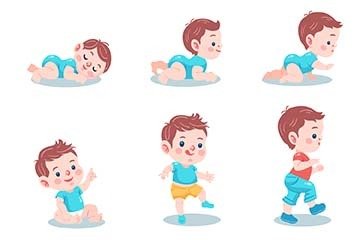Child Development holds greater significance in the field of psychologists, nutritionist, and pediatricians and also holds value for educators, school professionals, counselors. It is something that the parents of the children must be aware as well. Preschools especially should take it as an opportunity to use their platform and raise awareness about child development stages, the milestones and take into notice the aspect of variations as well. The major theme of development delays are also an important part for the people working in schools to know and spread awareness to the other stakeholders especially with parents. Child development and its stages are well researched and developed by renowned psychologists and educationists.
The domains of child development need to be talked about. Each domain further has its own stages.
PHYSICAL AND MOTOR DOMAIN
The very first objective is that children need to develop physically in early childhood so they can do everyday tasks.
Physical development stages: The focus early on is immensely taken up by the physical and motor domain as it is what helps the child to explore the environment around, get to know different situations and act upon them. It is basically the stimulator of all other domains. The Fine motor and gross motor skills across the ages of 2 to 6 are taken care of and any development delay is hence needed to be carefully analyzed, diagnosed and needs intervention. Educators at Junior Delhi School Preschool are trained and have knowledge of these skills and work extensively upon them in school.
COGNITIVE DOMAIN
This domain of development has major work done by Jean Piaget, and many take it as a base to understand the child’s cognitive processes, the stages and characteristics.
Cognitive development stages:
- Sensorimotor- (Birth to 2 years) - Here the toddler are discovering the difference between themselves and their environment.
- Pre-operational (2 to 7 years of age) - Now the young children make certain symbolic thoughts and imagine things. Different types of Play holds greater significance in this stage.
Preschool children fall in this stage of cognitive development and hence the awareness of the characteristics should be known to the educators, school professionals and parents. Drawings, imagination, several type of play being at centre, Junior Delhi School facilitators show awareness and understanding of the same.
- Concrete operational (Ages 7 to 11) According to Piaget, thinking in this stage is characterized by logical operations, such as conservation, reversibility or classification, allowing logical reasoning.
- Formal operational (12+) is the stage where now the individuals involve themselves in abstract thinking and concepts.
SOCIAL and EMOTIONAL DOMAIN
Psychosocial Stages: Erikson proposes eight stages of psychosocial development in Individuals. For the age range of two to six which is the major focused age range for Junior Delhi School, the two stages for children are as follows.
Autonomy versus shame and doubt is the second stage of Erik Erikson's stages of psychosocial development. The age range is of 18 months to 3 years. As per Erikson, children at this stage want to and try to develop a sense of control over their physical abilities and own independence .They want to do things themselves. Initiative versus guilt is the third stage of Erik Erikson's theory of psychosocial development. During the initiative versus guilt stage, children assert themselves through play, exploration and other socialising with others.
LINGUISTIC DOMAIN
Universally, as researched and worked upon, several linguists have found approximate six stages. Considering the age of preschoolers. They socialize, communicate, and describe objects and feelings, develop friendship through use of language, comprehend and are gradually developing the language skills in all four areas of Speaking and Listening, Reading and writing. Junior Delhi School immensely prioritizes the LSRW skills in both physical and virtual schools.
MORAL DOMAIN
Moral Development Stages: Kohlberg developed three phases comprising of two stage each. The three levels are Pre-conventional, Conventional and Post-conventional. Pre-conventional morality is the first stage of moral development where children don't have a personal code of morality and depend on adults.The children of two to six are falling under this stage.The conventional level is the second stage and occurs during adolescence and adulthood. Here, individuals develop moral reasoning based on the rules of adult role models. At the Post conventional stage of moral development which is not age or gender bound, the moral decisions are built around law, society and own rational sense of self and conscience.
1.png)

